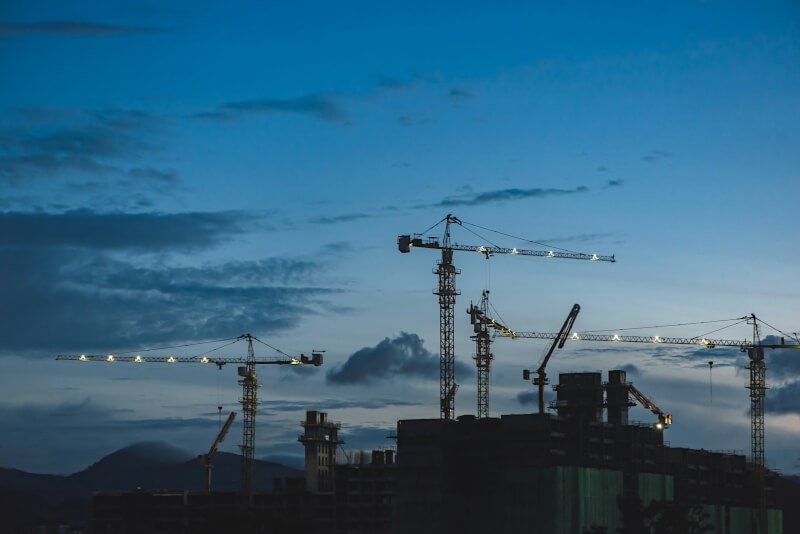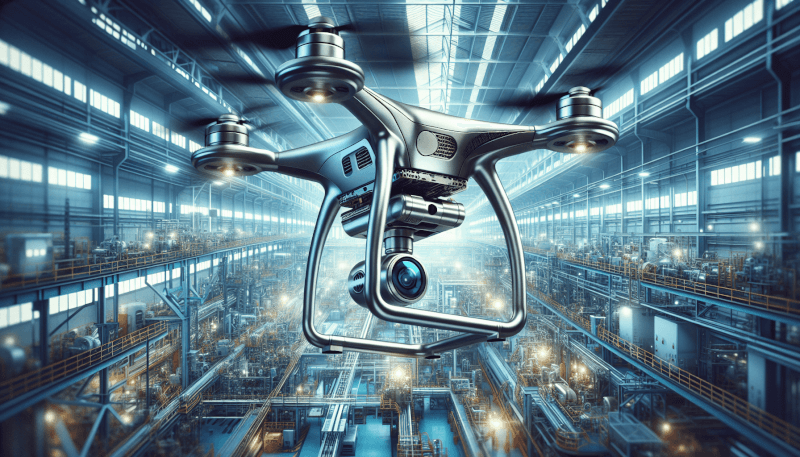Imagine being able to inspect industrial sites with ease and precision, while simultaneously reducing costs and increasing efficiency. With the advancements in drone technology, this is no longer just a dream. In this article, we will explore the best drones available for industrial inspections. These drones are equipped with state-of-the-art features, such as high-resolution cameras, thermal imaging capabilities, and precise navigation systems, making them perfect for inspections in various industries, including construction, oil and gas, and infrastructure maintenance. Say goodbye to the days of manual inspections and say hello to the future of industrial inspections with the best drones on the market.
Drone Requirements for Industrial Inspections
Payload Capacity
When it comes to industrial inspections, having a drone with a sufficient payload capacity is of utmost importance. The payload capacity refers to the maximum weight that a drone can carry, which is crucial for carrying the required equipment and tools during inspections. Whether it is a high-resolution camera, thermal imaging sensor, or other specialized equipment, a drone with a high payload capacity ensures that you can gather the necessary data without limitations. Therefore, when choosing a drone for industrial inspections, it is essential to consider the payload capacity and select one that can handle the specific requirements of your inspection tasks.
For different inspection purposes, the payload capacity needed may vary. For instance, if you are conducting inspections on tall structures such as wind turbines or power transmission lines, you may require a drone with a higher payload capacity to carry heavy cameras or sensors. On the other hand, if you are inspecting smaller objects or areas, a drone with a lower payload capacity might suffice. Therefore, it is crucial to assess your specific inspection needs and select a drone with an appropriate payload capacity for optimal results.
Some recommended drones with high payload capacity are the DJI Matrice 600 series, which can carry payloads up to 13.2 lbs (6 kg), and the Freefly Alta 6, which has a payload capacity of 15 lbs (6.8 kg). These drones are known for their robust build and reliable performance, making them suitable for various industrial inspection applications.
Flight Time
In industrial inspections, having a longer flight time provides numerous advantages. Flight time refers to the duration for which a drone can stay airborne before needing to recharge or replace its batteries. With longer flight time, you can cover more ground, inspect larger structures or areas, and reduce the time taken for inspections. This not only increases efficiency but also minimizes the need for frequent battery changes or recharging, saving valuable time in industrial inspection operations.
Several factors can affect flight time, including the drone’s size, weight, battery capacity, and power consumption. Larger drones often have more space for larger batteries, contributing to longer flight times. Additionally, drones with efficient propulsion systems and aerodynamic designs can extend their flight time. Therefore, it is essential to consider these factors when selecting a drone for industrial inspections.
There are drones available in the market with extended flight time suitable for industrial inspections. The DJI Matrice 300 RTK, for example, has a maximum flight time of up to 55 minutes, allowing for longer inspection missions. Similarly, the Yuneec H520 boasts a flight time of up to 38 minutes, providing ample time for thorough inspections. These drones combine longer flight times with other advanced features to enhance the efficiency and effectiveness of industrial inspections.

Camera Quality
For accurate and detailed inspections in industrial settings, high-quality cameras are indispensable. The camera quality of a drone plays a crucial role in capturing clear images and videos, enabling inspectors to identify potential issues, anomalies, or defects. It is essential to invest in a drone with a high-resolution camera that can provide sharp and detailed visuals for thorough analysis and documentation.
Several factors contribute to the camera quality of a drone, including the resolution, sensor size, and image stabilization capabilities. Higher resolution cameras allow for better clarity and precise inspection results. The sensor size also affects the image quality, especially in low-light conditions. Larger sensors capture more light and produce clearer images, which is particularly important for inspections conducted during dawn, dusk, or indoors. Furthermore, image stabilization features such as gimbal systems ensure smooth footage, reducing blurriness caused by drone movements or vibrations.
Prominent drones known for their exceptional camera quality include the DJI Inspire 2, equipped with a Zenmuse X5S camera capable of capturing 20.8-megapixel stills and 5.2K videos. Another notable option is the Autel Evo II, which offers an 8K camera for incredibly detailed inspections. These drones provide professional-grade cameras, enabling inspectors to capture high-resolution images and videos with remarkable clarity.
Stability and Maneuverability
In industrial inspections, stability and maneuverability are paramount. A stable drone can maintain a steady position even in challenging conditions or when exposed to strong winds. This stability is crucial for capturing clear and stable images, especially when conducting inspections that require precise details. Maneuverability, on the other hand, allows the drone to navigate through tight spaces, around obstacles, and reach areas that are difficult to access manually.
When selecting a drone for industrial inspections, it is crucial to consider key features that contribute to stability and maneuverability. Intelligent flight control systems, GPS-enabled navigation, and advanced sensors contribute to stable flight performance. Drones with multiple rotors, such as quadcopters and hexacopters, provide improved stability and maneuverability compared to single-rotor drones. These features enable the drones to maintain a stable position even in challenging environments and perform intricate flight maneuvers with ease.
Top drones known for their stability and maneuverability include the DJI Phantom 4 Pro, which is equipped with advanced flight control systems and obstacle sensing technology. The Autel Robotics Evo also offers exceptional stability and maneuverability, making it suitable for industrial inspections. These drones provide reliable flight performance, allowing inspectors to carry out inspections with confidence and precision.

Obstacle Avoidance
Obstacle avoidance technology in drones is of significant importance in industrial inspections, where obstacles such as structures, trees, or equipment must be avoided to ensure the safety of the drone and the surrounding environment. By utilizing obstacle avoidance systems, drones can detect and avoid potential collisions, mitigating the risk of accidents and damages. This technology enhances the overall safety and reliability of industrial inspections, allowing for smoother and obstacle-free flight paths.
There are different obstacle avoidance systems employed in drones, including visual sensors, radar systems, and LiDAR (Light Detection and Ranging) technology. Visual sensors, such as cameras and infrared sensors, help drones detect obstacles visually and adjust their flight path accordingly. Radar systems use radio waves to detect objects and assist in obstacle avoidance. LiDAR technology, which generates detailed 3D maps of the surroundings, enables drones to navigate safely in complex environments.
Drones with advanced obstacle avoidance capabilities include the DJI Mavic 2 Pro, equipped with omnidirectional obstacle sensing and advanced pilot assistance systems. Another excellent option is the Skydio 2, which utilizes an array of cameras to provide comprehensive obstacle avoidance and tracking capabilities. These drones offer enhanced safety features, ensuring smooth and accident-free inspections even in challenging environments.
Weather Resistance
Understanding the importance of weather-resistant drones is crucial for successful industrial inspections. Inspections often take place in various weather conditions, including rain, wind, and extreme temperatures. Without the necessary weather-resistant features, drones may experience difficulties or even become inoperable during adverse weather conditions. Therefore, selecting a drone with sufficient weather resistance capabilities is essential to ensure continuous and reliable operation in all environmental conditions.
The degree of weather resistance in drones is typically indicated by an IP (Ingress Protection) rating. The IP rating provides information about the level of protection against solids (dust) and liquids (water) that a drone possesses. Higher IP ratings represent a higher level of protection. For instance, an IP rating of IP54 indicates that the drone is protected against dust and can withstand water splashing from any direction.
Recommended drones for various weather conditions include the DJI Matrice 300 RTK, which presents a high IP rating, ensuring protection against challenging weather conditions. The Autel Evo II also offers excellent weather resistance features, making it suitable for inspections in adverse weather environments. These drones provide the necessary durability and reliability to withstand harsh weather conditions while delivering high-quality results.

Software and Automation
Software and automation play a crucial role in enhancing the efficiency and effectiveness of industrial inspections. Intelligent flight modes and mission planning capabilities simplify the inspection process and enable seamless integration of data collection and analysis. By utilizing advanced software and automation features, inspectors can optimize their workflow, reduce human error, and obtain accurate and consistent results.
Benefits of software and automation in industrial inspections include pre-programmed flight paths, waypoint navigation, and automatic data collection. Pre-programmed flight paths allow inspectors to define the exact path the drone should follow, ensuring comprehensive coverage of the inspection area. Waypoint navigation enables drones to fly autonomously, following a predefined sequence of points or areas of interest. Automatic data collection ensures that the drone captures and records the required data consistently and accurately.
Drones with advanced software and automation capabilities include the DJI Phantom 4 Pro, which offers intelligent flight modes such as ActiveTrack and TapFly. The Yuneec Typhoon H Pro is another notable option, featuring mission planning capabilities and waypoint navigation. These drones provide an array of software features, simplifying the inspection process and enabling efficient data collection.
Range and Connectivity
The range and connectivity capabilities of a drone are significant factors to consider in industrial inspections. The range refers to the maximum distance that the drone can fly from the remote controller while maintaining a stable connection. In industrial environments, where inspections may cover large areas or structures, having a drone with an excellent range ensures that you can cover the necessary ground without losing control or signal.
Connectivity options include Wi-Fi, radio frequencies, and transmission systems. Wi-Fi connectivity allows for a direct connection between the drone and the remote controller, suitable for shorter-range inspections or areas with good Wi-Fi coverage. Radio frequencies, such as the commonly used 2.4 GHz and 5.8 GHz bands, provide a stable and reliable connection over longer distances, making them ideal for industrial inspections that require greater range. Advanced transmission systems, such as DJI’s OcuSync 2.0, offer extended range and reliable connectivity by intelligently switching between frequencies.
Top drones with excellent range and connectivity options include the DJI Matrice 600 Pro, capable of reaching a range of up to 5 kilometers (3.1 miles) using the Lightbridge 2 transmission system. The Autel Robotics X-Star Premium also offers a range of up to 1.2 kilometers (0.75 miles) thanks to its extended range transmission system. These drones provide reliable long-range capabilities, ensuring uninterrupted communication between the drone and the remote controller.

Durability and Reliability
Durability and reliability are crucial factors to consider when choosing a drone for industrial inspections. Industrial environments can be challenging, with potential hazards such as strong winds, dust, and debris. A durable and reliable drone can withstand these conditions, ensuring that the inspection tasks can be completed without interruptions or equipment failures.
When assessing the durability of a drone, factors such as the materials used in its construction, build quality, and resistance to impact are essential considerations. Drones made from high-quality materials, such as carbon fiber or reinforced plastics, offer better durability. Additionally, drones with designs that provide protection for critical components, such as motors and propellers, enhance their reliability in challenging conditions.
Reliable drones prioritize robust construction and incorporate redundant systems to ensure continuous operation even in case of component failures. These drones have built-in fail-safe mechanisms and intelligent flight control systems that can compensate for unexpected situations, such as loss of GPS signal or propulsion system failures.
Selecting reliable drones for industrial inspections include the DJI Agras T20, designed specifically for industrial applications with a robust build and advanced flight control systems. The Yuneec H520 is another reliable option, featuring redundant systems and a rugged design. These drones offer high durability and exceptional reliability, ensuring uninterrupted inspections in demanding industrial settings.
Price Range
Considerations for budget constraints are an important aspect when selecting a drone for industrial inspections. The price range of drones can vary significantly depending on their specifications, capabilities, and features. It is vital to balance the desired features and performance with the available budget to make an informed decision.
When evaluating the price range, factors such as the specific inspection requirements, the expected return on investment, and the long-term cost of ownership should be considered. It is advisable to prioritize essential features and functionalities relevant to the inspection tasks while being mindful of the overall cost.
Affordable drones without compromising quality include the DJI Mavic Air 2, which offers a good balance between price and performance, delivering high-quality images and flight stability. The Autel Evo Lite is another cost-effective option, providing reliable flight performance and camera capabilities. These drones provide excellent value for money, making them suitable options for industrial inspections with budget constraints.
In conclusion, selecting the best drone for industrial inspections involves considering various requirements and factors. The payload capacity determines the drone’s ability to carry essential equipment, while flight time is crucial for covering larger areas efficiently. The camera quality ensures accurate inspections, and stability and maneuverability enable precise movements during the inspection process. Obstacle avoidance systems and weather resistance features enhance safety and reliability. Software and automation streamline the workflow, and range and connectivity provide flexibility for inspections. Durability and reliability guarantee consistent performance, and the price range should align with budget constraints. By understanding and evaluating these requirements, you can choose the most suitable drone for your industrial inspection needs.



